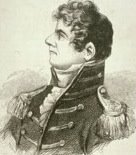Eminent domain
The House of Bishops meeting at Camp Allen this week are to be commended and thanked for the great gift they have given this Church and the world. Their unequivocal reaffirmation of this Church, its mission, and its people--all its people-- is simple, direct, and inspiring. Their words and actions speak not only to this Church, but to all people everywhere seeking evidence that God is calling them to Himself, and that He does not want anyone left behind.
The bishops' ringing affirmation of one of the foundational elements of Anglicanism--that national churches are established and governed by those within their jurisdictions--is an equally important contribution to the Church as we continue our reception of the primates' communique.
The principle is explicitly and repeatedly promoted in the preface of every Book of Common Prayer, in the same language originally adopted at Philadelphia in 1789. If we had to guess, this principle of "full and equal liberty" to model our institutions and worship consistent with the constitutions and laws of this nation, is probably never more important than when foreign bishops attempt to direct, influence, usurp or undermine, the fruits of that full and equal liberty.
The bishops reminded us all that regardless of the intent, neither the primates of the Anglican Communion, nor any other body or person outside our Church, can exercise the power of eminent domain over this church.
It's a principle that's rooted in our history and that informs our discernment. It is highly cherished. It's based on Anglican experience and practice for the past 500 years, and the constitution and history of this Church, not on any notion of "American exceptionalism." And the principle is not confined to this Church. Sovereign autonomy and discernment is particular to each and every church in the Anglican Communion.
With the reminder that we already embraced this principle and have been operating on it for generations, the Episcopal Church, comprised of and governed by all its orders, not just the one the communique wishes to hear from, can continue its reception of that document and associated items.
It must be said that given the stridency of the requests to ignore our own history, constitution, and discernment, both as a Church and as individuals gifted with reason and all the other blessings of this life, any such requests will likely continue to be met with extreme scrutiny.
Our reception and responses are being noted by many around the country and abroad. Though this attention may give some pause, we must welcome it as an opportunity to let all know that wherever they are and wherever they have been, The Episcopal Church welcomes them.
If they ask us why we do this, we need to let them know the simple answer: we do this not in our name, but in the Lord's. He long ago exercised the right of eminent domain and claimed this Church as His.
The bishops' ringing affirmation of one of the foundational elements of Anglicanism--that national churches are established and governed by those within their jurisdictions--is an equally important contribution to the Church as we continue our reception of the primates' communique.
The principle is explicitly and repeatedly promoted in the preface of every Book of Common Prayer, in the same language originally adopted at Philadelphia in 1789. If we had to guess, this principle of "full and equal liberty" to model our institutions and worship consistent with the constitutions and laws of this nation, is probably never more important than when foreign bishops attempt to direct, influence, usurp or undermine, the fruits of that full and equal liberty.
The bishops reminded us all that regardless of the intent, neither the primates of the Anglican Communion, nor any other body or person outside our Church, can exercise the power of eminent domain over this church.
It's a principle that's rooted in our history and that informs our discernment. It is highly cherished. It's based on Anglican experience and practice for the past 500 years, and the constitution and history of this Church, not on any notion of "American exceptionalism." And the principle is not confined to this Church. Sovereign autonomy and discernment is particular to each and every church in the Anglican Communion.
With the reminder that we already embraced this principle and have been operating on it for generations, the Episcopal Church, comprised of and governed by all its orders, not just the one the communique wishes to hear from, can continue its reception of that document and associated items.
It must be said that given the stridency of the requests to ignore our own history, constitution, and discernment, both as a Church and as individuals gifted with reason and all the other blessings of this life, any such requests will likely continue to be met with extreme scrutiny.
Our reception and responses are being noted by many around the country and abroad. Though this attention may give some pause, we must welcome it as an opportunity to let all know that wherever they are and wherever they have been, The Episcopal Church welcomes them.
If they ask us why we do this, we need to let them know the simple answer: we do this not in our name, but in the Lord's. He long ago exercised the right of eminent domain and claimed this Church as His.


1 Comments:
Rowan Williams simply must meet with the American bishops face-to-face.
Help make it happen.
Post a Comment
<< Home